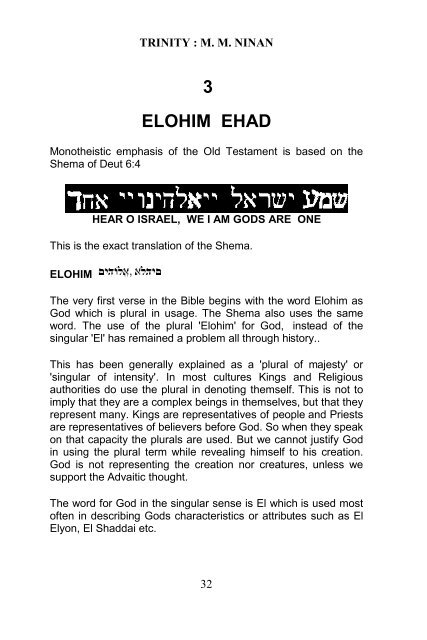Christian Understanding of Trinity3
Create successful ePaper yourself
Turn your PDF publications into a flip-book with our unique Google optimized e-Paper software.
TRINITY : M. M. NINAN<br />
3<br />
ELOHIM EHAD<br />
Monotheistic emphasis <strong>of</strong> the Old Testament is based on the<br />
Shema <strong>of</strong> Deut 6:4<br />
HEAR O ISRAEL, WE I AM GODS ARE ONE<br />
This is the exact translation <strong>of</strong> the Shema.<br />
ELOHIM<br />
The very first verse in the Bible begins with the word Elohim as<br />
God which is plural in usage. The Shema also uses the same<br />
word. The use <strong>of</strong> the plural 'Elohim' for God, instead <strong>of</strong> the<br />
singular 'El' has remained a problem all through history..<br />
This has been generally explained as a 'plural <strong>of</strong> majesty' or<br />
'singular <strong>of</strong> intensity'. In most cultures Kings and Religious<br />
authorities do use the plural in denoting themself. This is not to<br />
imply that they are a complex beings in themselves, but that they<br />
represent many. Kings are representatives <strong>of</strong> people and Priests<br />
are representatives <strong>of</strong> believers before God. So when they speak<br />
on that capacity the plurals are used. But we cannot justify God<br />
in using the plural term while revealing himself to his creation.<br />
God is not representing the creation nor creatures, unless we<br />
support the Advaitic thought.<br />
The word for God in the singular sense is El which is used most<br />
<strong>of</strong>ten in describing Gods characteristics or attributes such as El<br />
Elyon, El Shaddai etc.<br />
32


















